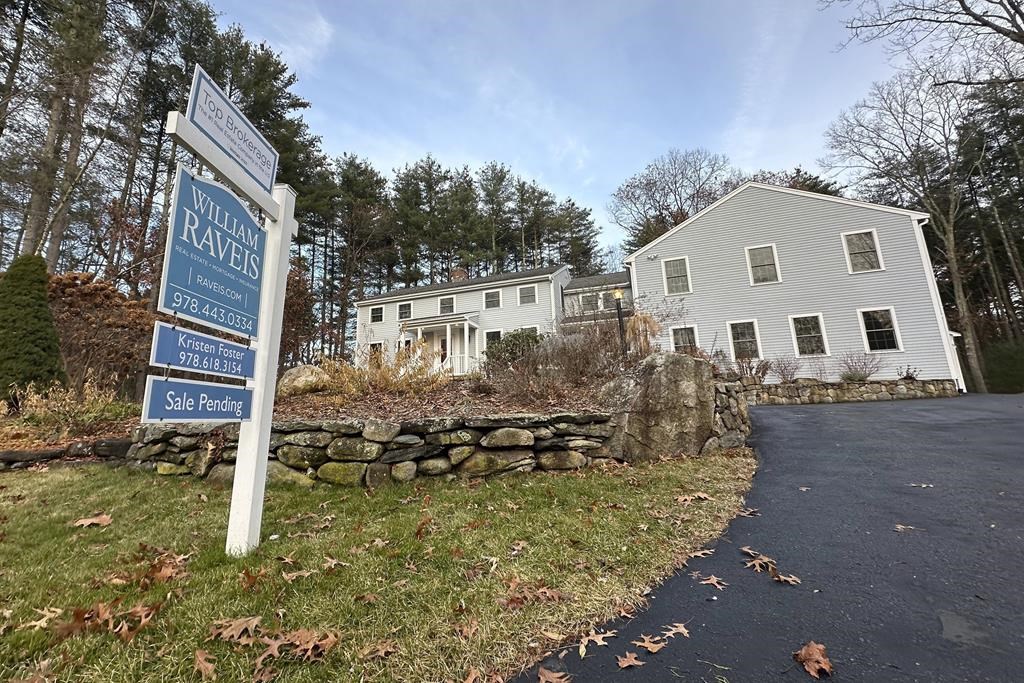5-month skid in home sales snapped in November as easing mortgage rates give buyers breathing room

LOS ANGELES (AP) — Sales of previously occupied U.S. homes rose in November, ending a five-month skid, as easing mortgage rates provided some breathing room for homebuyers.
Existing home sales rose 0.8% last month from October to a seasonally adjusted annual rate of 3.82 million, the National Association of Realtors said Wednesday. That tops the 3.78 million sales pace economists were expecting, according to FactSet.
Sales were still down 7.3% compared with November last year, and are down 19.3% through the first 11 months of 2023 compared with the same period last year.
Advertisement
The pickup in sales helped push up home prices compared with a year earlier for the fifth month in a row. The national median sales price rose 4% from November last year to $387,600.
The modest increase in sales arrives with mortgage rates in decline after a sharp runup that sent borrowing costs on home loans higher. The rising cost of borrowing money compounded hurdles for buyers because there are so few homes on the market, sending home prices higher as well.
The average rate on a 30-year mortgage has eased after climbing to 7.79% in late October to its highest level since late 2000. The average dropped to 6.95% last week, according to mortgage buyer Freddie Mac.
“Home sales always respond to lower interest rates,” said Lawrence Yun, the NAR’s chief economist, adding that he has “no doubt” that home sales have hit their low point in the current housing market cycle.
Despite the recent decline, the average rate on a 30-year home loan remains sharply higher than just two years ago, when it was around 3%. The large gap between rates now and then is contributing to the low inventory of homes for sale by discouraging homeowners who locked in rock-bottom rates two years ago from selling.
Advertisement
Homebuyers in many markets continue to face a low inventory of available homes for sale. There were 1.13 million homes on the market by the end of last month, down 1.7% from October, but up 0.9% from November last year, the NAR said. Before the pandemic, there were roughly twice as many homes on the market.
The available inventory at the end of last month amounted to a 3.5-month supply, going by the current sales pace. That’s down 3.6% from the previous month, but up from 3.3% from November 2022. In a more balanced market between buyers and sellers, there is a 4- to 5-month supply.
“If the inventory levels were, say, 30% or 40% higher, surely home sales would be probably 10% or 20% above what (they are) today,” Yun said. “A lack of inventory is clearly holding back some of the sales potential.”
Homebuyers still had to navigate a competitive market due to the shortage of properties on the market, especially the most affordable homes.
Homes sold last month typically within just 25 days after hitting the market, and about 19% of properties sold for more than their list price, a sign that many homes are still receiving multiple offers, the NAR said.
Advertisement
First-time homebuyers who don’t have any home equity to put toward their down payment have had a particularly tough time getting into the housing market this year. They accounted for 31% of all homes sold last month, which is an improvement over 28% in October, but still well below the 40% of sales they’ve typically accounted for historically.
The pullback in mortgage rates in recent weeks has echoed a decline in the 10-year Treasury yield, which lenders use as a guide to pricing loans. The yield, which in mid October surged to its highest level since 2007, has been falling on hopes that inflation has cooled enough for the Federal Reserve to shift to cutting interest rates after yanking them dramatically higher since early last year.
Housing economists are generally forecasting that mortgage rates will continue to decline in 2024, helping lift home sales after a dismal 2023.
Yun is forecasting that the a 30-year home loan will average 6.3% next year. He’s also predicting sales of previously occupied U.S. homes will climb 13.5% next year to a seasonally adjusted annual rate of 4.71 million, and expects the inventory of homes on the market will climb 30% to around 1.5 million by summer.
Advertisement
Alex Veiga, The Associated Press